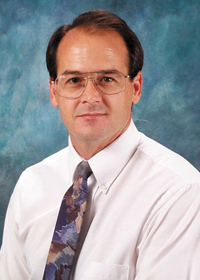 UNMC researcher Geoffrey Thiele, Ph.D., answers questions about his work, life and interests.
UNMC researcher Geoffrey Thiele, Ph.D., answers questions about his work, life and interests.
NOTE: This profile is part of a series highlighting the 25 researchers who were named UNMC Distinguished Scientists for 2006. Each of these researchers will be profiled in UNMC Today leading up to a March 12 ceremony to recognize their achievements.
- Name: Geoffrey M. Thiele, Ph.D.
- Title: Professor, internal medicine; professor (Courtesy), pathology/microbiology; researcher, Omaha VA Medical Center
- Joined UNMC: 1984
- Hometown: Omaha/Bellevue
Describe your research in 25 words or less.
Our research program is focused on determining the mechanism(s) by which the immune system attacks your own body. Various diseases and animal models are used.
How did you decide to pursue this area of research?
It chose me. I never actively pursued this course of study. I sort of gravitated toward this area as I very much enjoyed the work.
When did you realize you were interested in research?
In high school and college I liked the biological sciences and pursued my interests. After graduation from college, I still did not know what I wanted to do. I thought I would try to get my master’s of science degree and figure out what was next. I began a graduate career in the laboratory of Thomas L. McDonald, Ph.D., and I really liked research. So, I skipped my master’s degree and went directly for my Ph.D.
What are the greatest challenges in research today?
Obtaining extramural funding. Also, the limited number of students and post-doc’s who want to do academic research.
Best advice for new researchers?
“Pay attention to details,” is what my Ph.D. mentor Dr. McDonald would drive home to me. Even experiments that “do not work” are trying to “tell” you something. They worked, just not the way you expected them to.
When an experiment stalls, what drives you to continue on?
Three things and they are all very interrelated: stubbornness, desire and intellectual curiosity.
- I am a very stubborn person. I really believe that I can make anything work given the time and resources. If it didn’t work, I will figure out why.
- You have to have the desire to perform the studies. So, when it doesn’t work, you have to re-apply yourself and not get dejected.
- I spent the time thinking the experiments through, devised them and believed they should work. Why didn’t they? Now my intellectual curiosity has gotten the best of me.
Who has been your greatest teacher?
I cannot answer this with one person. From each of the following — Thomas McDonald, Ph.D., David Purtilo, M.D., Dean Tuma, Ph.D. and Lynell Klassen, M.D. — I learned things that have been invaluable in my career and I try to thank them whenever I can.
Tell us about your family and hobbies outside the lab.
- Lorraine Thiele, my wife of 23 years. The rock in my life and the most understanding person I know. All of our friends say she should be up for sainthood for putting up with me. She is a manager in pensions at Mutual of Omaha.
- Jennifer Christine Thiele, my 19 year-old daughter who is a sophomore at UNL. If you want to make me smile just mention her name.
- Geoffrey Eric Thiele. Geoffrey is a 14 year-old freshman at Creighton Prep High School. An excellent athlete and student who thinks his job in life is to challenge the “old man” whenever he can. He keeps me young.
Globally, describe the most notable research achievement ever?
I thought about penicillin, the microscope and many others. But, I would have to say that Watson and Crick and the discovery of the double helix of DNA are the most notable. I am not a “gene-jock” but this by far has had the most impact on modern research and medicine.
Clarify a common misconception about research?
That every experiment goes exactly as outlined. I have had this happen only once or twice in my career. Also, the experiment results in definitive data. That is, no further experimentation needs to be done as the results are irrefutable. When someone tells me either of these things, the “red flags” come out.
What would you tell a student interested in a research career?
Become fully aware of what you are getting into. Most students get into the research field because they like the experiments and just doing research. However, if they are successful there are so many things they will be doing that are no longer working at the bench. I was fortunate as my mentors let me know these things ahead of time and helped me as I moved into the next level. There were no surprises.
List three things few people know about you.
- I was a diver for the UNL Swimming and Diving Team, placing fifth on the one-meter board and 10th on the three-meter board my sophomore year before I hurt my back and ended my career.
- I am a homebody. I would rather be at home or work (my other home) than anywhere else. I like my “stuff” around me. Good thing my wife is the same way.
- Most of my best ideas occur to me either in the shower or at the gym while working out.